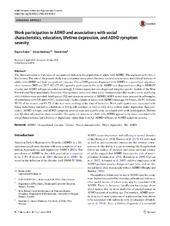| dc.contributor.author | Anker, Espen | en_US |
| dc.contributor.author | Halmøy, Anne | en_US |
| dc.contributor.author | Heir, Trond | en_US |
| dc.date.accessioned | 2019-06-19T12:58:09Z | |
| dc.date.available | 2019-06-19T12:58:09Z | |
| dc.date.issued | 2019-06 | |
| dc.Published | Anker E, Halmøy A, Heir T. Work participation in ADHD and associations with social characteristics, education, lifetime depression, and ADHD symptom severity. ADHD Attention Deficit and Hyperactivity Disorders. 2019;11(2):159–165 | eng |
| dc.identifier.issn | 1866-6647 | |
| dc.identifier.issn | 1866-6116 | |
| dc.identifier.uri | https://hdl.handle.net/1956/20246 | |
| dc.description.abstract | The literature refers to high rates of occupational failure in the population of adults with ADHD. The explanation for this is less known. The aim of the present study was to examine associations between social characteristics and clinical features of adults with ADHD and their occupational outcome. Out of 1050 patients diagnosed with ADHD in a specialized outpatient clinic between 2005 and 2017, 813 (77.4%) agreed to participate in the study. ADHD was diagnosed according to DSM-IV criteria, and ADHD subtypes recorded accordingly. Lifetime depression was diagnosed using the specific module of the Mini International Neuropsychiatric Interview. Occupational status and other social characteristics like marital status and living with children were recorded. Intelligence (IQ) and symptom severity of ADHD (ASRS score) were assessed in subsamples of participants (n = 526 and n = 567, respectively). In this sample of adults with ADHD (mean age 36.9 years, 48.5% women), 55.3% of the women and 63.7% of the men were working at the time of inclusion. Work participation was associated with being male, being married or cohabitant, or living with children, as well as a life story without major depression. Age, education, ADHD subtype, and ADHD symptom severity were not significantly associated with work participation. Neither was IQ when adjusted for other covariates. Occupational outcome in adults with ADHD appears to be more associated with social characteristics and a history of depression, rather than with IQ, ADHD subtype, or ADHD symptom severity. | en_US |
| dc.language.iso | eng | eng |
| dc.publisher | Springer Nature | eng |
| dc.rights | Attribution CC BY | eng |
| dc.rights.uri | http://creativecommons.org/licenses/by/4.0 | eng |
| dc.subject | ADHD | eng |
| dc.subject | Occupational outcome | eng |
| dc.subject | Gender | eng |
| dc.subject | Social characteristics | eng |
| dc.subject | Major depression | eng |
| dc.subject | IQ | eng |
| dc.subject | ASRS | eng |
| dc.title | Work participation in ADHD and associations with social characteristics, education, lifetime depression, and ADHD symptom severity | en_US |
| dc.type | Peer reviewed | |
| dc.type | Journal article | |
| dc.date.updated | 2019-02-04T13:40:26Z | |
| dc.description.version | publishedVersion | en_US |
| dc.rights.holder | Copyright 2018 The Author(s) | |
| dc.identifier.doi | https://doi.org/10.1007/s12402-018-0260-2 | |
| dc.identifier.cristin | 1617965 | |
| dc.source.journal | ADHD Attention Deficit and Hyperactivity Disorders | |

